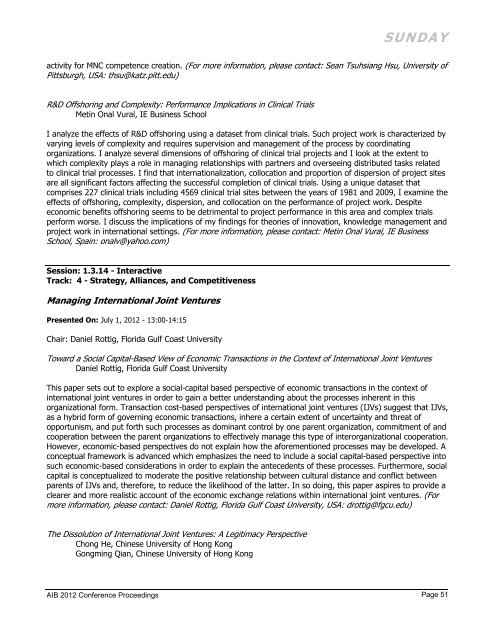AIB 2012 Conference Proceedings - Academy of International ...
AIB 2012 Conference Proceedings - Academy of International ...
AIB 2012 Conference Proceedings - Academy of International ...
Create successful ePaper yourself
Turn your PDF publications into a flip-book with our unique Google optimized e-Paper software.
SUNDAY<br />
activity for MNC competence creation. (For more information, please contact: Sean Tsuhsiang Hsu, University <strong>of</strong><br />
Pittsburgh, USA: thsu@katz.pitt.edu)<br />
R&D Offshoring and Complexity: Performance Implications in Clinical Trials<br />
Metin Onal Vural, IE Business School<br />
I analyze the effects <strong>of</strong> R&D <strong>of</strong>fshoring using a dataset from clinical trials. Such project work is characterized by<br />
varying levels <strong>of</strong> complexity and requires supervision and management <strong>of</strong> the process by coordinating<br />
organizations. I analyze several dimensions <strong>of</strong> <strong>of</strong>fshoring <strong>of</strong> clinical trial projects and I look at the extent to<br />
which complexity plays a role in managing relationships with partners and overseeing distributed tasks related<br />
to clinical trial processes. I find that internationalization, collocation and proportion <strong>of</strong> dispersion <strong>of</strong> project sites<br />
are all significant factors affecting the successful completion <strong>of</strong> clinical trials. Using a unique dataset that<br />
comprises 227 clinical trials including 4569 clinical trial sites between the years <strong>of</strong> 1981 and 2009, I examine the<br />
effects <strong>of</strong> <strong>of</strong>fshoring, complexity, dispersion, and collocation on the performance <strong>of</strong> project work. Despite<br />
economic benefits <strong>of</strong>fshoring seems to be detrimental to project performance in this area and complex trials<br />
perform worse. I discuss the implications <strong>of</strong> my findings for theories <strong>of</strong> innovation, knowledge management and<br />
project work in international settings. (For more information, please contact: Metin Onal Vural, IE Business<br />
School, Spain: onalv@yahoo.com)<br />
Session: 1.3.14 - Interactive<br />
Track: 4 - Strategy, Alliances, and Competitiveness<br />
Managing <strong>International</strong> Joint Ventures<br />
Presented On: July 1, <strong>2012</strong> - 13:00-14:15<br />
Chair: Daniel Rottig, Florida Gulf Coast University<br />
Toward a Social Capital-Based View <strong>of</strong> Economic Transactions in the Context <strong>of</strong> <strong>International</strong> Joint Ventures<br />
Daniel Rottig, Florida Gulf Coast University<br />
This paper sets out to explore a social-capital based perspective <strong>of</strong> economic transactions in the context <strong>of</strong><br />
international joint ventures in order to gain a better understanding about the processes inherent in this<br />
organizational form. Transaction cost-based perspectives <strong>of</strong> international joint ventures (IJVs) suggest that IJVs,<br />
as a hybrid form <strong>of</strong> governing economic transactions, inhere a certain extent <strong>of</strong> uncertainty and threat <strong>of</strong><br />
opportunism, and put forth such processes as dominant control by one parent organization, commitment <strong>of</strong> and<br />
cooperation between the parent organizations to effectively manage this type <strong>of</strong> interorganizational cooperation.<br />
However, economic-based perspectives do not explain how the aforementioned processes may be developed. A<br />
conceptual framework is advanced which emphasizes the need to include a social capital-based perspective into<br />
such economic-based considerations in order to explain the antecedents <strong>of</strong> these processes. Furthermore, social<br />
capital is conceptualized to moderate the positive relationship between cultural distance and conflict between<br />
parents <strong>of</strong> IJVs and, therefore, to reduce the likelihood <strong>of</strong> the latter. In so doing, this paper aspires to provide a<br />
clearer and more realistic account <strong>of</strong> the economic exchange relations within international joint ventures. (For<br />
more information, please contact: Daniel Rottig, Florida Gulf Coast University, USA: drottig@fgcu.edu)<br />
The Dissolution <strong>of</strong> <strong>International</strong> Joint Ventures: A Legitimacy Perspective<br />
Chong He, Chinese University <strong>of</strong> Hong Kong<br />
Gongming Qian, Chinese University <strong>of</strong> Hong Kong<br />
<strong>AIB</strong> <strong>2012</strong> <strong>Conference</strong> <strong>Proceedings</strong><br />
Page 51

















